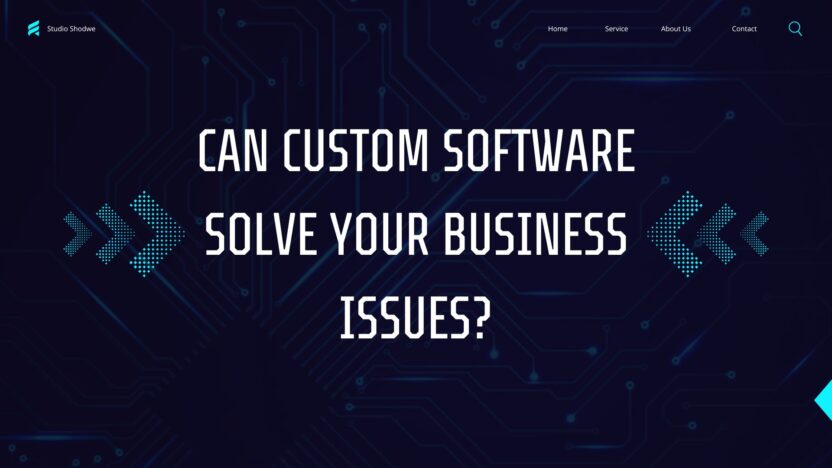In today’s digital world, businesses face more challenges than ever before. From managing operations and improving customer service to boosting productivity and staying competitive — there’s a lot to juggle.
Many companies turn to software tools to make things easier. But not all tools are created equal.
So, the big question is:
Can custom software actually solve your business problems?
Let’s explore the answer.
What Is Custom Software?
Custom software is a tailor-made solution designed specifically for your business. Unlike off-the-shelf software, which is built for mass use, custom software focuses on solving your unique challenges.
Imagine a suit made just for you. It fits perfectly and makes you look your best. That’s what custom software does for your business — it fits your needs and helps you perform better.
Common Business Issues Companies Face
Before we understand how custom software helps, let’s look at some common problems businesses experience:
1. Poor Workflow Efficiency
Too many manual processes slow things down and lead to errors.
2. Lack of Integration
Your systems don’t “talk” to each other. For example, your sales, inventory, and accounting platforms may all be separate.
3. Data Management Confusion
Important data is scattered across multiple platforms, making it hard to access or understand.
4. Difficulty Scaling
Your current tools don’t grow with your business. You keep hitting roadblocks.
5. Bad User Experience
Customers or staff find your systems confusing or frustrating to use.
How Custom Software Solves These Problems
1. Better Workflow and Automation
Custom software can automate repetitive tasks, such as billing, reporting, or scheduling. This saves time, reduces errors, and allows your team to focus on more important work.
Example: An automated invoicing system tailored to your business rules can save hours each week.
2. Full Integration
A custom solution can connect all your systems into one platform. This helps reduce silos, makes data flow smoother, and improves decision-making.
Example: Your inventory system talks to your sales and shipping system, so orders are handled faster.
3. Smarter Data Use
With custom software, you can create dashboards and reports that give you exactly the insights you need — no more guesswork.
Example: Track customer trends and use that data to make marketing decisions.
4. Scalability
As your business grows, your custom software can grow with you. You can add new features or users without needing a whole new system.
Example: Start with a simple customer portal and expand into a full CRM over time.
5. Improved User Experience
You can design the software for ease of use. When systems are easier to use, your team works faster, and your customers are happier.
Example: A smooth, custom checkout experience keeps more customers from abandoning their carts.
When Should You Choose Custom Software?
Here are a few signs you might need a custom solution:
- Your business has unique needs no off-the-shelf tool can meet
- You’re wasting time on manual tasks
- You use multiple disconnected tools
- Your team or customers complain about your current system
- You want to grow, but your tech is holding you back
If any of these apply to you, it’s time to consider custom software.
Custom Software vs. Off-the-Shelf Software
| Feature | Custom Software | Off-the-Shelf Software |
|---|---|---|
| Fit | Designed for your exact needs | Generic features for many users |
| Cost | Higher upfront, but long-term value | Lower upfront, but may need many workarounds |
| Flexibility | Fully adaptable | Limited customisation |
| Support | Dedicated support for your system | General support, often slower |
| Competitive Edge | Gives you unique tools | Same tools your competitors use |
Real Results You Can Expect
When you invest in custom software, here’s what you might see:
- More productivity — your team spends less time on low-value tasks
- Better accuracy — automation reduces human error
- Faster decisions — data is easier to access and analyse
- Higher customer satisfaction — smoother services and better experiences
- Long-term savings — fewer software subscriptions, less time fixing problems
Conclusion
Custom software is not just a luxury. It’s a smart investment that can directly solve your business challenges and help you grow. Whether you’re looking to automate tasks, unify systems, or deliver a better customer experience, a tailored solution could be exactly what you need.
If you’re ready to take that step, partnering with a trusted custom software development Canada provider can help turn your vision into a reality — with the right tools for long-term success.
FAQs
Q1: Is custom software expensive?
It may cost more upfront than pre-made tools, but it provides better long-term value by solving your specific needs and reducing ongoing issues.
Q2: How long does it take to build custom software?
It depends on the size and complexity of your project. A simple tool might take a few weeks, while a full system could take several months.
Q3: Can small businesses use custom software?
Absolutely! Custom software can be scaled to suit any size of business, including startups and SMEs.
Q4: What industries benefit from custom software?
Almost every industry — including healthcare, logistics, retail, finance, and education — can benefit from tailored solutions.
Q5: What happens after the software is built?
You’ll get ongoing support, updates, and improvements based on feedback, so your software continues to serve your business well.


